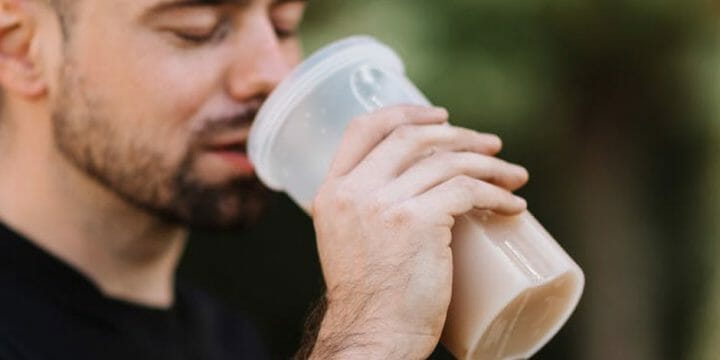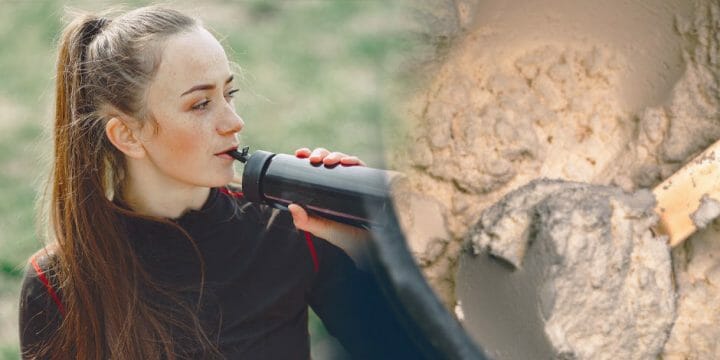You might be taking the right amount of protein for your workout needs.
However, if you're not properly timing your protein consumption, chances are you’re not reaping its maximum benefits and not using it correctly to achieve your fitness goals.
So, when’s the best time to drink a protein shake — before or after a workout?
I did a lot of searching on what experts and researchers say about protein powders - let's dive in and settle the matter once and for all.
Quick Summary
When is the Best Time to Consume Protein?
The best time to consume protein depends on your fitness goals, schedule, and even preference.
So, there isn't a right or wrong answer for this, and you can either go for a pre-workout protein shake or post-workout protein shake to help you build muscle mass.
However, both ways of consuming protein shakes have potential advantages and disadvantages.
Consuming Protein Before Workout
Benefits

- Kickstart protein synthesis. It triggers muscle protein synthesis, fuels muscle energy (MPS), repairs muscle damage, and builds mass while reducing post-workout muscle breakdown and soreness. Consuming protein before a workout can enhance excess post-exercise oxygen consumption (EPOC), leading to increased calorie burn post-training.
- Curb Appetite. Protein keeps you full longer and can prevent overeating.
- Convenience. Protein shakes are a quick, easy alternative to cooking and offer fast-absorbing amino acids, unlike slower food sources like beef.
Disadvantages

Feeling Too Heavy
If you have a sensitive stomach or trouble digesting protein powder, pre-workout shakes might make you feel heavy or upset your stomach, affecting your performance. In this case, opt for a post-workout shake instead.
For gut issues, try hydrolyzed protein powders with pre-digested amino acids, lactose-free options (whey protein isolate), or plant-based proteins for easier absorption.
Consuming Protein After Workout
Benefits

- Speeds up muscle repair and recovery. High-quality protein shakes supply amino acids for repairing and strengthening muscle micro-tears induced by training, kickstarting recovery.
"The best time to consume protein is half an hour to two hours after working out. Protein shakes are also a great choice because your body can easily digest it, so protein is readily available for muscle repair and recovery."
— Marie A. Spano, MS, RD, CSCS, CSSD, Leading Sports Nutritionist for the Atlanta Braves
- Replenish lost fluids. Protein shakes, mixed with plenty of water or milk, help restore fluids lost through sweat.
Disadvantages

There aren't significant disadvantages to post-workout protein shakes.
They're highly recommended for athletes and gym-goers for muscle recovery. However, the type of protein powder matters. Casein or whey protein, derived from milk, are preferred for their muscle-building benefits.
Whey protein, in particular, is excellent due to its high bioavailability (90–100%), meaning it's efficiently absorbed and used by the body for muscle building, offering great value.
Drinking Protein Shake Depending on Your Fitness Goal
Based on my experience both as a coach and a fitness enthusiast, here are the best times to have your protein shake, tailored to your specific fitness goals.
Muscle Growth

Research published in the Journal of Nutrition shows that muscle protein synthesis is higher when consuming protein in moderate amounts (30 grams per meal) throughout the day compared to eating the recommended daily protein intake at once (0.8 grams per kilogram of one's body weight) [1].
Protein shakes can be a convenient way to achieve this, providing the complete protein you need. However, exercise caution and don't hastily purchase protein powders as they are not regulated by the FDA, especially those labeled as 'proprietary blends,'
We've spent months analyzing and testing most of the protein powders on the market to guide you and save time.
Remember, muscle growth also requires enough calories and a balanced diet, including carbohydrates from whole grains, beans, fruits, and vegetables, and healthy fats from sources like nuts, seeds, fish, olive oil, and avocados.
Prevent Muscle Loss

In my years of coaching, I've seen that, starting around age 30, muscle loss becomes a real concern, leading to weakness and increased injury risks. That's why it's critical to focus on muscle preservation early on.
Being physically active is vital, and taking protein supplements can also help slow age-related muscle loss.
A study in the Current Opinion in Clinical Nutrition and Metabolic Care recommends distributing protein intake evenly throughout the day, aiming for 25–30 grams of protein per meal, to enhance protein synthesis and maintain muscle mass [2].
Lose Weight

For those targeting fat loss, consuming protein a few hours before a workout can suppress appetite and provide necessary nutrition. A protein shake post-workout can also be beneficial, preventing overeating and helping to manage snacking habits.
Exercise Recovery and Performance

Like refueling a car, consuming carbohydrates after exercise replenishes glycogen stores used up during the activity, speeding up recovery.
How Much Protein Should You Have Every Day?

Here are the best protein powders on the market:
FAQs
How Long Before a Workout Should I Drink Protein Shake?
You should drink a protein shake as soon as you can after a workout in order to start the recovery process immediately. Protein uptake is faster after you workout, meaning your body delivers amino acids faster to the muscles.
What Happens if I Don't Eat Protein After A Workout?
If you don't eat protein after a workout, you may suffer from muscle weakness and slow muscle recovery. Protein should be on the top of your list of nutrients to consume after a workout.
Drinking a post-workout protein shake or consuming protein in a different way supports muscle recovery.
Does Protein Make You Gain Weight?
Yes, protein can cause weight gain if you take more protein than your body needs, resulting in an excess calorie intake every day. Extra protein is also stored as body fat.
What Happens if I Lift Weights but Don't Eat Protein?
If you lift weights or do strength training but don’t eat enough protein, you will gain fat and won’t grow muscle. Exercising without adequate protein can lead to losing muscle and decreasing fitness.
Protein provides the essential amino acids for muscle building after doing weight training.
Will Your Muscles Grow Without Protein?
Your muscles may or may not grow without protein. Though protein alone won’t make your muscles grow (so you have to pay attention to other nutrient requirements such as carbs), they play a large role in getting you shredded.
This is because our muscles are made up of protein, and consuming enough protein can help you gain muscle mass.
References:
- https://jn.nutrition.org/
- https://pubmed.ncbi.nlm.nih.gov/19057193/
- https://pubmed.ncbi.nlm.nih.gov/24670946/
- https://jissn.biomedcentral.com/articles/10.1186/s12970-017-0177-8
- https://bjsm.bmj.com/content/52/6/376
- https://ajcn.nutrition.org/
About The Author
You May Also Like






